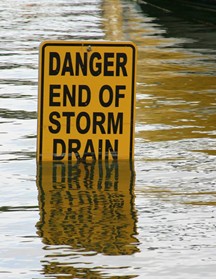 Oil Spill Pollution due to floods can happen any time of year, but winter and early spring run-off are the most likely times for this kind of disaster. Hurricane Katrina, a significant natural disaster, was responsible for the release of more than 7 million gallons of oil into the environment. This originated from oil storage facilities, processing plants, and pipelines. Business owners are responsible for any contamination and cleanup caused by their hazardous materials that may get swept down stream during a flood.
Oil Spill Pollution due to floods can happen any time of year, but winter and early spring run-off are the most likely times for this kind of disaster. Hurricane Katrina, a significant natural disaster, was responsible for the release of more than 7 million gallons of oil into the environment. This originated from oil storage facilities, processing plants, and pipelines. Business owners are responsible for any contamination and cleanup caused by their hazardous materials that may get swept down stream during a flood.
A spill contingency plan should address this possibility and provide a plan of action during a flood event. Keeping a Hazardous Material Inventory with the plan is an important piece of information, especially when you need to know the quantities that may get wash away in a flood. Following are other tips to prevent oil pollution from your site during a flood.
- Store drums and other containers with liquid contents in or on secondary containment to lift them higher off the ground.
- If a layer of oil is on water in your basement or on your property, do not pump the water until you remove the oil.
- Use absorbent oil pads to collect the oil film off the surface of the water.
Protect Yourself and the Environment
Before a Flood Occurs
You don’t have to be a manufacturer or in an industrial business to have hazardous waste after a flood. For example, retailers might have to dispose of flood-damaged hazardous products, such as garden pesticides or pool chemicals. Prepare for disaster clean-up by making sure you have the following items readily available:
- hazmat spill-kits
- oil absorbents
- gloves
- boots
- coveralls
- eye protection
- duct tape
- plastic bags
- overpack drums
Home owners with an underground fuel storage tank can be suseptible to flooding caused pollution. The State of Washington Department of Ecology (http://www.ecy.wa.gov/pubs/0909190.pdf) gives the following advice to help prevent undergound tanks from leaking during floods:
- Keep gas in the tank, at least 1/3 to 2/3’s full, but do not fill to the top so there is room for any potential floodwater without overflowing.
- Make sure all openings on the top of the tank are securly closed.
Taking the necessary steps before a natural disaster is critical to protect yourself from liability, and the enviroment from pollution. Oil Spill prevention is always the best policy.
